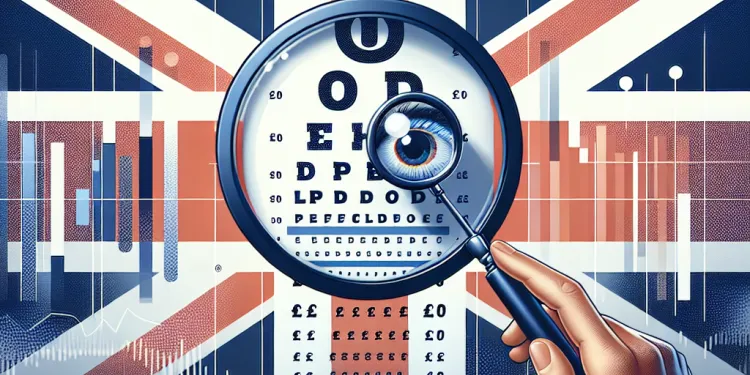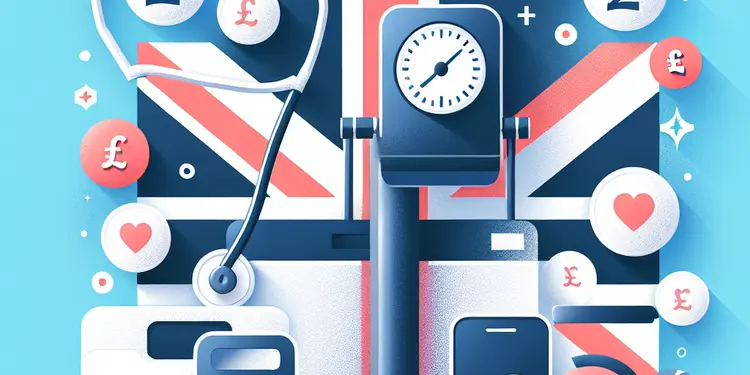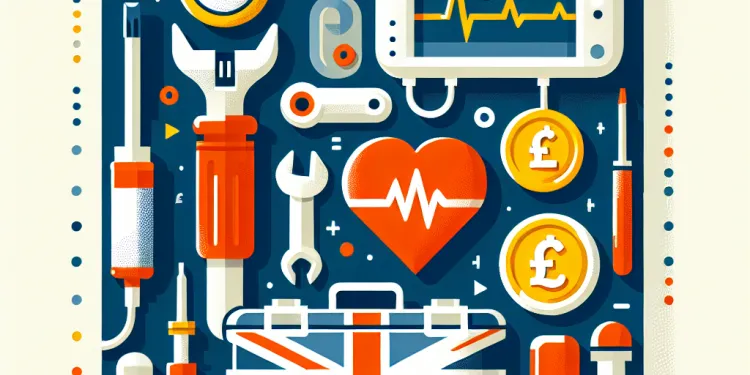
Find Help
More Items From Ergsy search
-

Can self-testing help me track my prescription changes?
Relevance: 100%
-

What should I do if I notice changes during self-testing?
Relevance: 62%
-

Why would someone need to self-test their eyes?
Relevance: 60%
-

Can self-testing detect all eye conditions?
Relevance: 56%
-

Should I share the results of my self-tests with my eye doctor?
Relevance: 55%
-

Are self-tests a substitute for professional eye exams?
Relevance: 54%
-

What are the limitations of self-testing for eyes?
Relevance: 52%
-

How often should I self-test my eyes?
Relevance: 52%
-

What is self-testing for eye patients?
Relevance: 52%
-

Do I need any special equipment for eye self-testing?
Relevance: 50%
-

Do insurance plans cover the cost of self-testing tools?
Relevance: 49%
-

How do I use a vision chart for self-testing?
Relevance: 48%
-

What age groups can benefit from self-testing?
Relevance: 48%
-

Is it possible for self-tests to cause harm?
Relevance: 48%
-

Do I need a prescription for Ozempic?
Relevance: 43%
-

What types of self-tests are available for eye patients?
Relevance: 43%
-

Is a prescription required for Paillon treatment?
Relevance: 43%
-

Can prescription drugs lead to drug offences?
Relevance: 42%
-

Can I use a smartphone for self-testing my eyes?
Relevance: 41%
-

Do stoma bags require a prescription?
Relevance: 40%
-

Is a prescription needed for mobility equipment?
Relevance: 39%
-

Do I need a prescription for weight loss jabs?
Relevance: 39%
-

How can I track my walking progress?
Relevance: 38%
-

How does self testing for eye patients work?
Relevance: 38%
-

Is a prescription required for Wegovy tablets?
Relevance: 37%
-

Is it better to track fat by grams or percentage of calories?
Relevance: 37%
-

Do I need a prescription to get a stool DNA test?
Relevance: 35%
-

Is a prescription needed for air physiotherapy?
Relevance: 34%
-

Are there any self-tests for eye pressure?
Relevance: 34%
-

Where can I find reliable self-testing tools for my eyes?
Relevance: 33%
-

Are there mobile apps to track air quality and its impact on asthma?
Relevance: 33%
-

Let's Talk Sexual Health - Home Self Testing Kits
Relevance: 30%
-

Should I change my passwords regularly?
Relevance: 24%
-

How are self-assessment taxpayers affected by the 2026 changes?
Relevance: 21%
-

What if my circumstances change?
Relevance: 20%
-
What is being done globally to track COVID-19 variants?
Relevance: 20%
-

Are there changes to the eviction process?
Relevance: 20%
-

What maintenance do defibrillators require?
Relevance: 20%
-

Will changing my password secure my hacked account?
Relevance: 20%
-

What is a tracker mortgage and how does it respond to interest rate changes?
Relevance: 19%
Introduction
For individuals who rely on prescription medications, understanding how changes in medication can impact health is crucial. Self-testing offers a way for patients in the UK to monitor their health conditions and observe how their prescriptions affect their well-being. This method of tracking can empower individuals to make informed decisions about their health in collaboration with healthcare professionals.
What is Self-Testing?
Self-testing involves using at-home diagnostic tools to track health markers, such as glucose levels, cholesterol, and blood pressure. These tests are typically easy to use and offer immediate results. With advancements in technology, self-testing kits are increasingly becoming more accessible and affordable for the general public. They allow for continuous monitoring without the need for frequent visits to a healthcare facility.
Benefits of Self-Testing for Prescription Changes
When a doctor adjusts a prescription, it can take time to understand how the new medication affects your body. Self-testing can help you:
- Monitor Immediate Effects: Self-testing can quickly show how a new medication affects your health markers, such as blood sugar levels for diabetic patients.
- Track Long-Term Trends: Regular testing over a period can provide data, helping you and your healthcare provider understand the long-term impact of a medication.
- Improve Communication with Healthcare Providers: With data from self-tests, you can have more informed discussions with your GP about how a medication is working for you.
Popular Self-Testing Kits in the UK
In the UK, various self-testing kits are available over-the-counter or online. These include:
- Blood Glucose Meters: Essential for diabetics to monitor blood sugar levels and adjust their medications accordingly.
- Blood Pressure Monitors: Useful for those with hypertension to manage and assess the effectiveness of treatment plans.
- Cholesterol Tests: Helps in tracking lipid levels, particularly when starting or changing cholesterol medications.
Limitations of Self-Testing
While self-testing offers convenience, it is not without limitations. It's important to remember:
- Accuracy: Home tests are generally reliable, but they can occasionally give inaccurate results. Always confirm significant changes with a lab test if possible.
- Misinterpretation: Without professional advice, you might misinterpret results. Regular consultation with your healthcare provider is crucial.
Conclusion
Self-testing can be a valuable tool in managing prescription medications and understanding their effects on your health. While it provides insightful data, it should complement, not replace, professional medical advice. By using self-testing kits judiciously, patients in the UK can have more control over their health and medication management.
Introduction
If you take medicine from the doctor, it is important to know how changes in your medicine can affect your health. In the UK, self-testing helps people check their health at home and see how their medicine is working. This can help you make better choices about your health with your doctor.
What is Self-Testing?
Self-testing means using simple tools at home to check things like blood sugar, cholesterol, and blood pressure. These tests are easy to use and show results fast. New technology makes self-testing kits cheaper and easier to get. They help you keep an eye on your health without going to the doctor all the time.
Benefits of Self-Testing for Prescription Changes
When a doctor changes your medicine, it might take time to see how it affects you. Self-testing can help you:
- See Quick Changes: Self-tests can show fast how new medicine affects things like blood sugar in people with diabetes.
- Watch Long-Term Effects: By testing regularly, you and your doctor can see how the medicine works over time.
- Talk Better with Your Doctor: With self-test results, you can have better talks with your doctor about your medicine.
Popular Self-Testing Kits in the UK
In the UK, you can buy different self-testing kits in shops or online. These include:
- Blood Glucose Meters: Important for people with diabetes to check blood sugar and change medicine if needed.
- Blood Pressure Monitors: Good for people with high blood pressure to see how treatment is working.
- Cholesterol Tests: Helps check fat levels in the blood, especially when starting new cholesterol medicine.
Limitations of Self-Testing
While self-testing is handy, there are some things to remember:
- Accuracy: Home tests usually work well, but sometimes they can give wrong results. It's good to check big changes with a lab test.
- Understanding Results: Without a doctor, you might get confused by your results. Always talk to your doctor regularly.
Conclusion
Self-testing is a useful way to manage your medicine and see how it affects your health. It gives you useful information but should not replace advice from your doctor. By using self-tests wisely, people in the UK can better manage their health and medicine with their doctor’s help.
Frequently Asked Questions
Useful Links
This website offers general information and is not a substitute for professional advice.
Always seek guidance from qualified professionals.
If you have any medical concerns or need urgent help, contact a healthcare professional or emergency services immediately.
- Ergsy carfully checks the information in the videos we provide here.
- Videos shown by Youtube after a video has completed, have NOT been reviewed by ERGSY.
- To view, click the arrow in centre of video.
- Most of the videos you find here will have subtitles and/or closed captions available.
- You may need to turn these on, and choose your preferred language.
- Go to the video you'd like to watch.
- If closed captions (CC) are available, settings will be visible on the bottom right of the video player.
- To turn on Captions, click settings .
- To turn off Captions, click settings again.
More Items From Ergsy search
-

Can self-testing help me track my prescription changes?
Relevance: 100%
-

What should I do if I notice changes during self-testing?
Relevance: 62%
-

Why would someone need to self-test their eyes?
Relevance: 60%
-

Can self-testing detect all eye conditions?
Relevance: 56%
-

Should I share the results of my self-tests with my eye doctor?
Relevance: 55%
-

Are self-tests a substitute for professional eye exams?
Relevance: 54%
-

What are the limitations of self-testing for eyes?
Relevance: 52%
-

How often should I self-test my eyes?
Relevance: 52%
-

What is self-testing for eye patients?
Relevance: 52%
-

Do I need any special equipment for eye self-testing?
Relevance: 50%
-

Do insurance plans cover the cost of self-testing tools?
Relevance: 49%
-

How do I use a vision chart for self-testing?
Relevance: 48%
-

What age groups can benefit from self-testing?
Relevance: 48%
-

Is it possible for self-tests to cause harm?
Relevance: 48%
-

Do I need a prescription for Ozempic?
Relevance: 43%
-

What types of self-tests are available for eye patients?
Relevance: 43%
-

Is a prescription required for Paillon treatment?
Relevance: 43%
-

Can prescription drugs lead to drug offences?
Relevance: 42%
-

Can I use a smartphone for self-testing my eyes?
Relevance: 41%
-

Do stoma bags require a prescription?
Relevance: 40%
-

Is a prescription needed for mobility equipment?
Relevance: 39%
-

Do I need a prescription for weight loss jabs?
Relevance: 39%
-

How can I track my walking progress?
Relevance: 38%
-

How does self testing for eye patients work?
Relevance: 38%
-

Is a prescription required for Wegovy tablets?
Relevance: 37%
-

Is it better to track fat by grams or percentage of calories?
Relevance: 37%
-

Do I need a prescription to get a stool DNA test?
Relevance: 35%
-

Is a prescription needed for air physiotherapy?
Relevance: 34%
-

Are there any self-tests for eye pressure?
Relevance: 34%
-

Where can I find reliable self-testing tools for my eyes?
Relevance: 33%
-

Are there mobile apps to track air quality and its impact on asthma?
Relevance: 33%
-

Let's Talk Sexual Health - Home Self Testing Kits
Relevance: 30%
-

Should I change my passwords regularly?
Relevance: 24%
-

How are self-assessment taxpayers affected by the 2026 changes?
Relevance: 21%
-

What if my circumstances change?
Relevance: 20%
-
What is being done globally to track COVID-19 variants?
Relevance: 20%
-

Are there changes to the eviction process?
Relevance: 20%
-

What maintenance do defibrillators require?
Relevance: 20%
-

Will changing my password secure my hacked account?
Relevance: 20%
-

What is a tracker mortgage and how does it respond to interest rate changes?
Relevance: 19%


